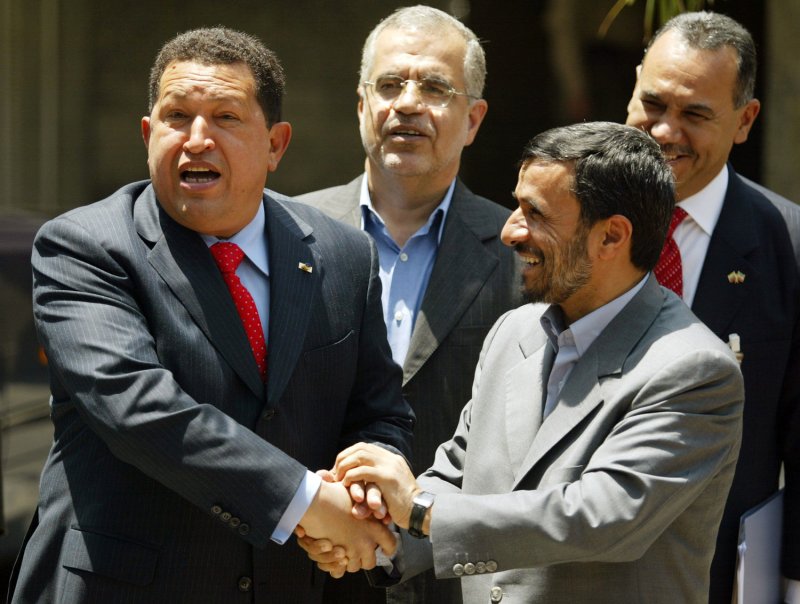Iran's President Mahmoud Ahmadinejad (R) shakes hands with Venezuela's President Hugo Chavez (L) during a welcoming ceremony for Chavez in Tehran, Iran on July 1, 2007. Chavez arrived in Tehran late Saturday for a two-day visit which officials said was aimed at boosting political and economic cooperation between the two countries. (UPI Photo/Mohammad Kheirkhah) |
License Photo
MIAMI, March 19 (UPI) -- Two U.S. representatives from Florida introduced legislation seeking to designate Venezuela a state sponsor of terror, a move that could hurt the country's oil sector and U.S. relations in the region.
Ileana Ros-Lehtinen and Connie Mack, both Republicans, made their request amid allegations Venezuela pledged $300 million in funding to Colombia's leading leftist rebel group, the Revolutionary Armed Forces of Colombia, or FARC.
"Evidence that the Venezuelan government might have given aid and comfort to violent extremists is reprehensible and must not be ignored," said Ros-Lehtinen, who is the ranking Republican on the House Foreign Affairs Committee. "The decision of Venezuelan leaders to support the criminal acts of these violent extremists has poisoned the region with instability and distrust."
A recent memo released by the lawmakers to the media also notes Venezuela's expressed "willingness to cooperate" with Iran on proposed joint nuclear-energy projects. Iran is already on the U.S. State Department's list of state sponsors of terrorism. Other members are Cuba and North Korea.
Interpol is investigating a laptop allegedly containing documents linking Venezuela to FARC that belonged to a rebel leader killed by Colombian forces. If those documents turn out to be true, it could set the stage for lawmakers to push through a terror-sponsor designation for Venezuela, effectively putting its multibillion-dollar oil industry in jeopardy.
For the Bush administration to push for sanctions, however, it would first need the legal framework to do so, said Jorge Pinon, a researcher at the Institute for Cuban and Cuban-American studies at the University of Miami and former president of Amoco Oil Latin America.
Proof of funding for FARC on the behalf of Venezuela would be a direct violation of U.N. Security Council Resolution 1373, of 2001, which says "states shall refrain from providing any form of support, active or passive, to entities or persons involved in terrorist acts."
"Calling Venezuela a terrorist state would give the United States a legal reason to impose sanctions," Pinon told United Press International.
However, designating Venezuela a terrorism sponsor and imposing sanctions against one of the United States' largest oil suppliers could prove too damning to the U.S. economy, he added, noting oil prices would likely increase $5-$10 per barrel were oil shipments from Venezuela halted or curtailed.
Venezuela provides the United States with about 1.4 million barrels of oil per day, mostly crude. But Venezuela would be paralyzed, too: The United States is its No. 1 customer and its refining facilities lie in this country.
Meanwhile, Venezuelan oil officials received some welcome news Tuesday when a judge in London unfroze $12 billion in Venezuelan assets seized last month amid a legal battle with U.S. petroleum giant ExxonMobil over the nationalization of its projects in Venezuela.
While most other foreign firms accepted the terms of the nationalization in which Venezuela's state-run energy firm PDVSA assumed majority control of their projects, ExxonMobil refused, leading to the seizure of its stake in the oil-rich Orinoco River.
"We won, our country won, our homeland won," Energy Minister Rafael Ramirez said after Tuesday's announcement. "The judge's decision is a lesson to ExxonMobil."
But the battle between Exxon and PDVSA is far from over, said Patrick Esteruelas, a Latin America analyst for the New York-based think tank Eurasia Group.
"Both companies will likely harden their positions, and continue to battle each other out in the courts over the next several years," he said.















